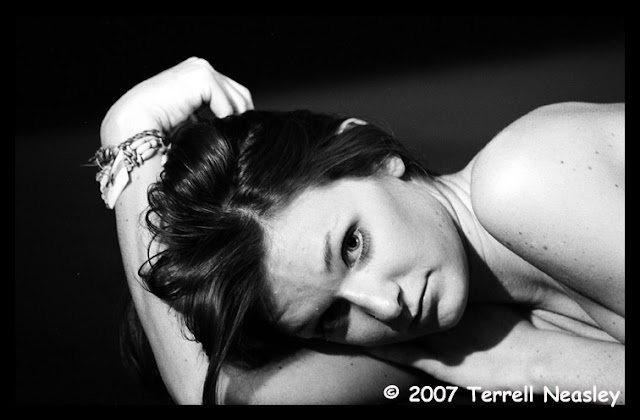 |
| Art Model, Dana |
In November of 2005, I photographed my first nude model. This month makes 16 years since I began my favorite genre of photography. So with respect to my beginnings, I'm going to address an idea for beginners! However, if you aren't interested in getting better at photo or at least learning more creative and fun techniques, don't worry about this blog post. Then again, read it anyway and see if your curiosity is piqued.
FILM PHOTOGRAPHY!!!
That's right. I am talking about stepping away from the digital world and falling back to the stone age before a camera even needed a battery. Yes, cameras existed even then and if you take a look around, you'll witness the re-emergence of the film genre. BTW, all the images in this post are my early work shooting film.
Look for an old camera that your mama used to use, or one that's been passed down through your father's lineage. Ask them! They just might take you up to the attic and pull out an old box full of pics, old film cannisters, and maybe even a dusty old camera.
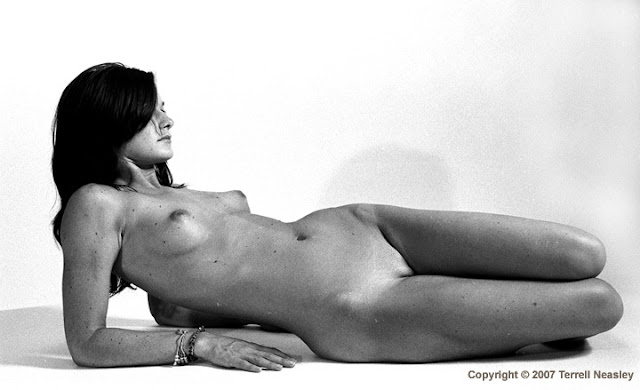 |
| Art Model, Dana |
OR, go to a thrift store. They almost always have something. If you see a camera and it has the letters, L-E-I-C-A on it, in that exact sequence... or a big red dot, GET IT! Buy it for whatever they want. If not, just look for something that seems like it works. If there is a local camera shop nearby, take it to them and let them have a look at it and clean it up.
OR, take a look at Amazon, Ebay, or any online used gear retailer and type Canon AE-1 Program in the search bar. If you are afraid of Canon, check out the Nikon F2, unless you want to get away from the BIG2... then bless yourself with a Pentax K1000. Go this route if you want an easy entry into the 35mm film genre as there are still plenty of camera choices, lens alternatives, and film formats readily available and you can always find someone to develop the film.
If by chance you are feeling froggy and you have nerves of steel with the heart of a champion, say no more and orient your quest toward either a Hasselblad 500 C/M, the Pentax 67, or a Mamiya RZ67. Lens choices can get steep with these but you can find some deals. You are really taking your coffee no sugar if you find a twin lens reflex system like a Rolleiflex, the Yashica MAT-124G, or a Mamiya C330. You don't need an additional lens budget for these cameras because they come with fixed lenses anyway. These cameras use medium format film. Much larger resolution than 35mm film, but might be more difficult getting it processed. You can easily do this yourself, though with a few lessons. Developing your own film just takes a commitment and for some, it's the least fun part of photography. I loved it!
 |
| Art Model, Kate in a Tribute to Jerry Ulesmann |
FOUR ADVANTAGES OF FILM PHOTOGRAPHY
I'm not going to get into the technical aspects of digital vs film. This post isn't about the analytical, technical, logical, and certainly not mathematical. Instead, I want to focus on the imaginative, artistic, and intuitive elements.
Film helps you See
Particularly in Black and White photography, color can be a distraction that deviates your mind away from the composition. When it's all B&W, composition plays a greater factor. When you look through the viewfinder, yes... you are still seeing color. But when you get that roll developed in B&W you see what you were pointing your camera at and how it turned out. You begin to see in B&W. Even though color elements are the input into your eye sockets, your brain will soon interpret those signals into B&W. THEN you begin to better see lines, patterns, geometric shapes... like circles, triangles, and rectangles. You'll see vanishing points, repetition, and anchoring elements. Balance will become important and you will develop your style much quicker.
Film helps you be Patient
Back in the military, I trained soldiers to slow down. Survey the landscape. Find your target. Aim. Breathe. Take your shot. The mechanics of shooting a weapon are the same as shooting a camera. Survey the landscape. Find your composition. Aim. Breathe. Take your shot. In both cases, you press the shutter/trigger with slow deliberation. Trigger squeeze and breathing control are two elements of marksmanship and it's the same with a camera.
Shooting rapid fire shots don't let you hit a damn thing. Limit yourself to 36 shots and you WILL learn to compose better. You will think about each shot and be more deliberate with your shot selection. It's inevitable. If you want to slow it down even more, shoot from a tripod and really see your shot. I follow this guy on Facebook. He's the father of a friend/client of mine who I worked with doing desert shots near Las Vegas. His dad is always out somewhere knee-deep in a stream or barely visible in the bushes somewhere. The man is enjoying himself and making money selling his art. But he puts in the time! He's not shooting film, but he does shoot from a tripod and I'd imagine it isn't just because his gear is heavy. His name is Sam Pathi and he's a bad ass landscape photographer. You want a role model? Inspire to be like this guy. You can see his son, Eric on IG @ericpwiseguys.
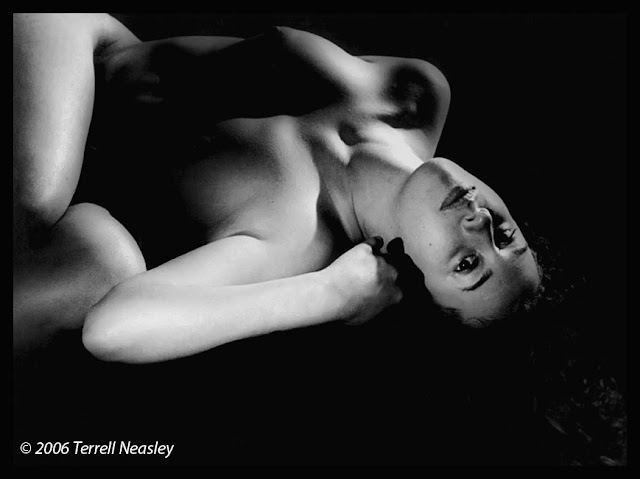 |
| Art Model, Jacinda |
“You don’t take a photograph, you make it.” – Ansel Adams
Film will help you Make Photos
Ansel Adams is arguably the most famous photographer all-time. That was one of his quotes that suggested that a photograph wasn't something that already existed and you simply needed to grab it. Instead, it was something you create. You make it. You don't simply take it. Aperture, Shutter Speed, and ISO are the elements you use to create the exposure you desire for any given scene. A shot does not exist without these three elements in some mix. Each one regulates and manages how light is used to make a photograph. Don't just use full auto. Learn this and practice.
You also make a photo by learning to focus manually. It takes an added second or two to turn that focus ring (at any given aperture, focusing at any given range). You decide how much of a scene you want in focus and then manipulate the lens to make that photo. Learn those techniques and practice.
Film will help you Save Money
This isn't as intuitive as the previous listed advantages, but it still goes on this list. You are definitely going to save some cash with film. You're looking at maybe a $250 initial investment maybe if you're going 35mm film. Expect to spend a grand for the camera, batteries, storage cards, lenses, etc. if you start out digital. Chances are, you'll likely find a deal on a digital camera that comes with a bad, tripod, and more.
This might not be the case if you get really interested in photography and you need to make a more significant investment. It will happen. The more you know, the more you grow. The more you grow, the more you go broke. Kidding. I should have said. the more you grow the more you need dough. But if you are getting better AND got the budget, mosey on up to the medium format systems and challenge yourself. Instead of 36 exposures a roll, you get 10 to 15 shots depending on the camera. That Pentax 67 will give you TEN shots! Talk about shot planning! It uses 120 roll film. And medium format utilizes a variety of sizes which explains the different range of shots.
* * *
Film is not dead. It declined for a while, but it's back. The Lomography phenomenon (and company) along with Kodak, Fujifilm, and others have fed the resurgence of love for film. But I say it's mainly because of people like Dave Rudin who refuse to give it up and continue to do professional and artistic work with film. It's huge here in Vietnam. There are good functioning cameras all over the place and in the hands of the young and eager. I love it.
So do yourself a favor, Rookie. Reread the blog. Do some more research. Get yourself in a good camera system that you feel comfortable with. Go buy some film and go shoot. Kodak TMAX 400 was my all-time favorite film to utilize. What is yours?
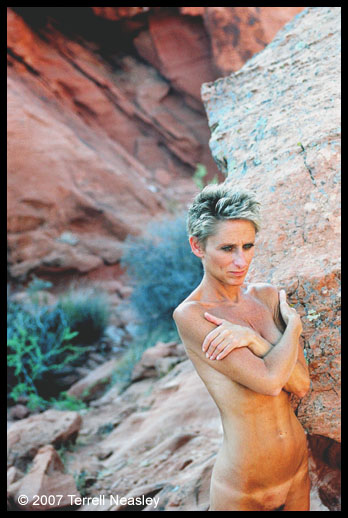 |
| Art Model, Laura |
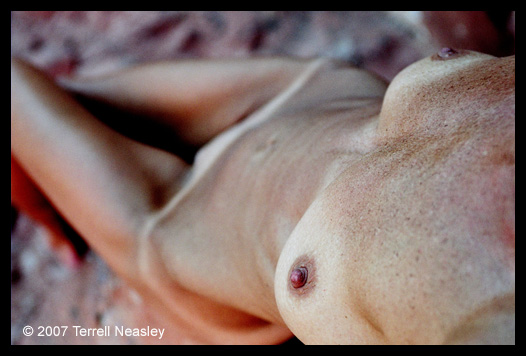 |
| Art Model, Laura |







